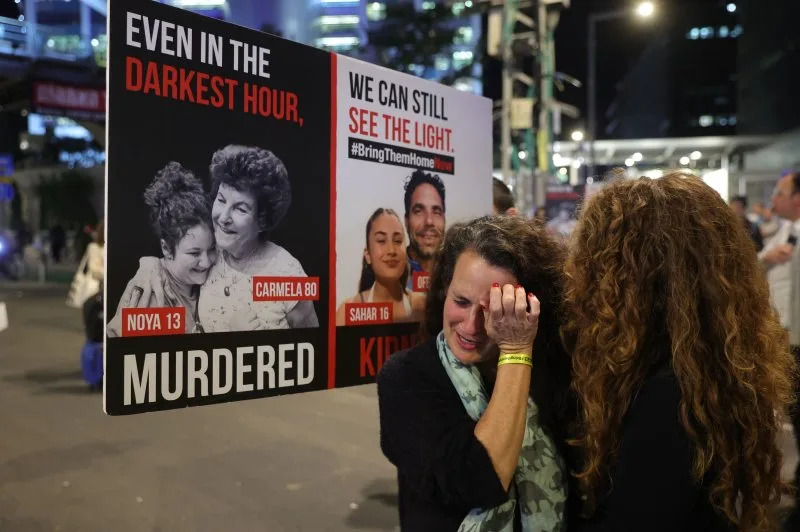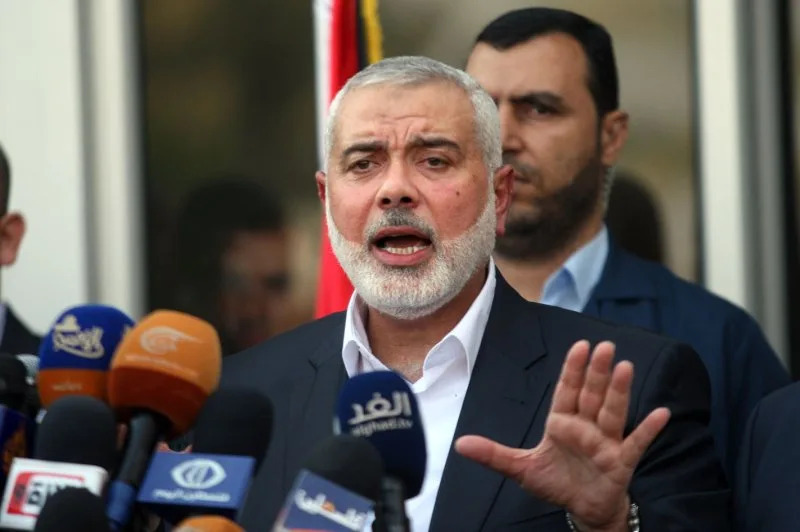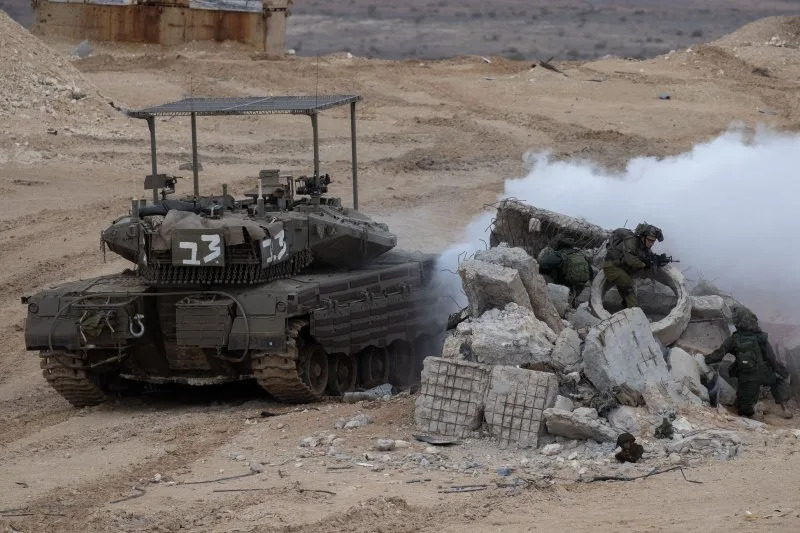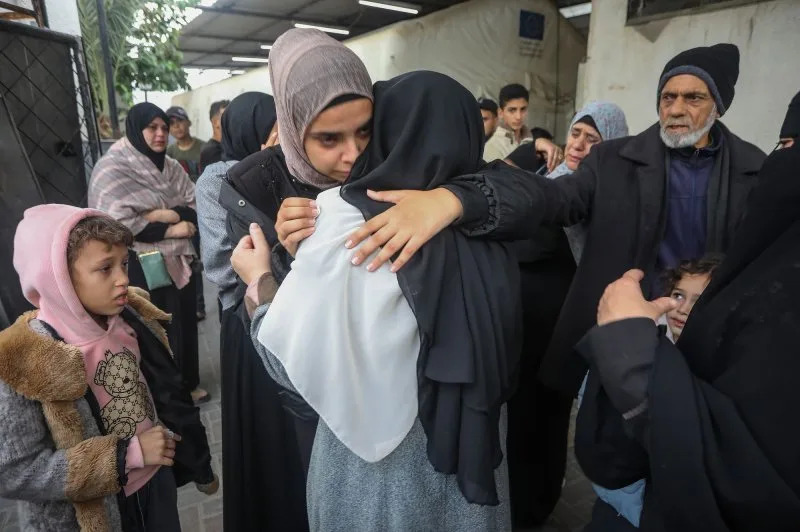Negotiations around the release of Israeli women and children held hostage in the Gaza Strip have centered on an exchange for Palestinian women and minors held in Israeli prisons. The size of that group has grown quickly during the six weeks of war and upheaval since the Oct. 7 Hamas attack on Israel, according to a Palestinian prisoners’ rights group.
The group, Addameer, says about 200 boys, most of them teenagers, were in Israeli detention as of this week, along with about 75 women and five teenage girls. Before Oct. 7, about 150 boys and 30 women and girls were in Israeli prisons, it said, and since then, many other detentions have occurred, as well as many releases.
Addameer said that it compiled the figures using data from the Israel Prison Service, which administers the country’s jails, and information from the families of detained people.
Relatives and supporters of Palestinians held in Israeli prisons staged a sit-in in front of the Red Cross in the West Bank city of Ramallah.
Early Wednesday, the Israeli government and Hamas announced they would uphold a four-day cease-fire in Gaza to allow for the release of 50 hostages captured during Hamas’ assault last month on Israel and 150 Palestinian prisoners held in Israel.
Many of the most recent arrests came during raids across the Israeli-occupied West Bank, where protests and violence have surged, including attacks on Palestinians by Israeli settlers. Israel has said that the arrests are part of a counterterror operation against Hamas in the West Bank.
There are also about 700 people missing from Gaza who are believed to be in Israeli prisons, but information on their whereabouts is murky, said Tala Nasir, a spokesperson for Addameer. It was not clear how many of those people, if any, were women or minors. The Israeli military has said it has apprehended 300 people in Gaza during the ground invasion who it claimed were connected to armed Palestinian groups and that they “were brought into Israeli territory for further interrogations.”
Of the roughly 240 Israeli hostages taken to Gaza by Hamas and other armed groups, 33 are minors, the youngest of whom is 9 months old, according to the Israeli government. At least 62 are women, according to an organization formed by the hostages’ families. Four of the women being held hostage are Israeli soldiers, according to interviews with their family members and information gathered by a forum of the hostages’ families.
As of this week, the total number of what Addameer calls Palestinian political prisoners in Israel — including people from Gaza, the West Bank and Israel — was 7,000, up from about 5,000 before Oct. 7, according to Addameer. That includes more than 2,000 people held in “administrative detention,” meaning they are being held indefinitely without charges, it said.
Nasir said that her group defines that category as Palestinians arrested for offenses that are related to political activity and free speech rather than crimes such as drugs or violence. She added that Addameer had received many reports in recent weeks of people arrested on charges of incitement for their social media posts in Israel and the West Bank. Earlier this month, the Knesset passed an amendment to a counterterrorism law that criminalized the “consumption of terrorist materials.”
Adalah, the Legal Center for Arab Minority Rights in Israel, said that it was monitoring 121 cases of arrests and detentions linked to social media posts, some of which “merely contained expressions of solidarity with the Palestinian people in Gaza, or even verses shared from the Quran.”
Rights groups have long warned that Palestinian detainees are held without due process and face abuse and even torture. Military Court Watch, a nonprofit legal group, said last year that of the 100 Palestinian children detained by Israeli forces that it had interviewed, 74% reported physical abuse, and 42% said they were put in solitary confinement.
The women in Israeli detention include Ahed Tamimi, 22, a high-profile figure in the West Bank who was sentenced to prison in 2018 for slapping an Israeli soldier. Israeli officials accused her of her posting hate speech online; her family said the post was not hers.
Six Palestinian detainees who were held without charges have died in Israeli prisons in recent weeks, according to Wafa, the Palestinian Authority’s news agency. One of them, Omar Daraghmeh, was a senior member of Hamas, the militant group said when his death was announced.
Hamas: 150 Palestinian prisoners to be released from Israeli jails as part of hostage deal with Israel.
Hamas agrees to release 50 hostages, temporary cease-fire with Israel.
A deal has been reached to release 50 women and children that were kidnapped by Hamas and is set to go into effect sometime on Thursday, following intensive international negotiations over the course of a month and a half, according to U.S. officials, the Israeli government and a statement from Hamas.
Israel and Hamas agreed to implement a temporary cease-fire for four days to allow for the safe transfer of hostages and the delivery of humanitarian aid into the Gaza Strip. The release of hostages is expected to trigger the release of Palestinian prisoners from Israeli jails, per a Hamas demand.
The U.S. believes that there are more children and women beyond the 50 that Hamas had identified for release, with a senior U.S. administration official telling reporters in a call on Tuesday night that Hamas has not been able to provide a comprehensive list of all the people who were kidnapped from Israel.
The U.S. expects Hamas to work throughout the pause in fighting to identify additional women and children to be released.
“The deal is now structured for women and children in the first phase, but with an expectation for further releases and the aim, the clear aim, is to bring all hostages home to their families,” the official said.
The cessation of fighting, what the administration is calling a “humanitarian pause,” can be extended beyond the four days if Hamas identifies and shows a willingness to release more hostages.
The Israeli government early Wednesday morning, local time, said in a statement that “the release of every additional 10 hostages will result in one additional day of the pause.”
Hamas kidnapped more than 200 people on Oct. 7 as part of its unprecedented terrorist attack against Israel — where at least 1,200 people were massacred, the vast majority civilians.
Along with women and children, other hostages include men, Israeli soldiers, dual nationals and foreign nationals. The Israel Defense Forces (IDF) earlier this week released a video that it said showed Hamas forcibly moving at least two hostages, a Thai civilian and a Nepalese civilian, through al-Shifa hospital in the Gaza Strip.
At least three Americans are expected to be released in the first phase of the deal, including two women and a three-year-old girl, Liz Hirsh Naftali, whose parents were killed amid Hamas’s assault on their community of Kfar Azza. Naftali is believed to be turning four this month.
The Biden administration has said there are 10 unaccounted for Americans, but has not said that they are all confirmed as hostages.
The pause in fighting is also expected to allow for humanitarian aid deliveries to be scaled up through the Rafah crossing between Egypt and the Gaza Strip, with thousands of Palestinians having been displaced from the north of Gaza to the south amid intense Israeli air bombardment as part of its war aim to eliminate Hamas. Civilians are lacking adequate access to water, food, medicine, shelter and more necessities and what international aid organizations have decried as a desperate humanitarian crisis.
Brett McGurk, Middle East Coordinator for the National Security Council, had earlier said that Hamas’s “bargain” for releasing the hostages was to increase aid to the strip.
Hamas also asked Israel to agree to the release of 150 Palestinian women and minors, under the age of 19, held in Israeli jails, the group said in a statement. The Israeli government is expected to publish the names of the prisoners and allow time for any possible court challenges to their release.
Hamas said that the four-day pause in fighting will prohibit “air traffic” in the south of Gaza, and in the north of Gaza for six hours daily, from 10 a.m. to 4 p.m. While Israel holds control of Gaza’s sky’s, the U.S. has also run surveillance drones over the strip to search for hostages.
The deal was reached through intensive mediation by the government of Qatar and Egypt, which served as intermediaries between Hamas military leaders hiding out in Gaza, to their political offices in Doha, Qatar, and on to U.S. and Israeli officials.
The senior U.S. official, who spoke with reporters on Tuesday, said a secret cell working to secure the release of hostages was established shortly after Hamas’s attack on Israel, and the extent of its kidnapping of civilians began to unfold.
Qatar initiated discussions with Israel and the U.S. to work toward the hostages’ release.
Calls between the U.S., Israel, Qatar and Egypt have taken place daily, sometimes hourly over the course of the month and a half of the ordeal, with Biden “directly and personally engaged in this process,” the official said.
“In fact, I just came from the Oval Office about half an hour ago… We are cautiously optimistic here that we are in the final stages of what has been an extremely excruciating five-week process.”
The deal marks an extraordinary development in the war between Israel and Hamas nearly seven weeks since Hamas shocked the world by breaking down and through Israel’s barrier with the Gaza Strip. Hamas fighters massacred and murdered civilians in their homes, at a music festival, and on the street under the cover of rocketfire across Israel in an attack they have failed to fully explain, other than what they view as their ultimate goal as to destroy the state of Israel.
Among the more than 200 kidnapped from southern Israel during Hamas’s terrorist attack include Israeli civilians, soldiers and people of dozens of other nationalities taken by Hamas, and some are also believed to have been taken by other designated terror groups, like Palestinian Islamic Jihad and Gazan civilians.
White House National Security Council Spokesperson John Kirby said on Tuesday that the U.S. does not have a full accounting of the exact number of hostages and who is holding them.
“I think it’s important to remember that other groups also likely hold some hostages… that Hamas may not have access to, or even immediate knowledge of with any great specificity,” he said during a call with reporters.
Israeli Prime Minister Benjamin Netanyahu has vowed to end Hamas, and Israel has carried out a punishing air campaign across the Gaza Strip, targeting what they said are Hamas combatants and their military infrastructure. But the devastation has led to the death of approximately 13,000 people — according to estimates provided by the Gaza Ministry of Health, which is under control of Hamas.
While Hamas does not disclose how many of those killed are its own members, more than 5,000 children are believed to be among those killed, and a senior U.S. official has said it is likely the death toll is higher than is currently being reported.
And Israel alleges that rocketfire from Gaza — by Hamas, Palestinian Islamic Jihad or others — has at times fallen back on the strip into civilian areas.
Netanyahu said Tuesday that Israel would not abandon its war against Hamas, even as it agreed to a pause to allow for the release of hostages.
President Biden has backed Israel’s military campaign into the Gaza Strip, saying that he supports Israel’s goal of dismantling Hamas’s military infrastructure to prevent the terror group from being able to carry out, again, an attack like that which occurred on Oct 7.
But the president and his senior officials have increasingly raised concern that Israel can do more to protect civilian life in Gaza.
Kirby, on a call with reporters on Tuesday, said that the administration has said they don’t support an expanded Israeli military ground campaign into southern Gaza “absent a cohesive plan by the Israelis to factor in how they’re going to be able to protect what is now mathematically a dramatically increased civilian population.”
“It’s even more incumbent upon the Israelis to make sure, before they begin operations down there, that they have factored in ways in which they can protect those civilians who moved at their urging to the South,” Kirby continued. “And I think that’s really about where I need to leave it.”
Israel considers potential hostage deal with Hamas.
Israel’s cabinet convened to consider a proposed hostage deal on Tuesday, in a meeting that stretched into the early hours of Wednesday local time, following meetings of the country’s war cabinet and security cabinet.
According to sources familiar with the negotiations, a draft of the proposed deal between Israel, Hamas and the US included the release 50 women and children hostages taken during the October 7 terror attack on Israel, in exchange for a four-to-five day pause in fighting and three Palestinian prisoners from Israeli prisons for every hostage released. The Palestinian prisoners are also expected to be women and adolescents.
“We are making progress. I don’t think it’s worth saying more, even at this moment, but I hope there will be good news soon,” Netanyahu said as he met with reservists on Tuesday.
US officials close to the negotiations have stressed that while the deal is not done, they are increasingly optimistic and believe the many weeks of difficult work is about to pay off with a hostage release.
The hostages to be released are of various nationalities, one source told CNN, adding that the Americans are hoping one of them will be 3-year-old toddler Abigail Edan – the youngest American hostage – whose parents were killed by Hamas. It was not immediately clear how many more – if any – American citizens would be among the 50 hostages that Hamas would initially release under the deal.
The hostages that Hamas offered for initial release are alive, the group says, according to a source familiar with the talks.
The Israeli government aims for at least 50 hostages to be released as part of the deal being mooted Tuesday – 10 per day for five days – an Israeli government source told CNN. The government would be prepared to extend the deal if Hamas is prepared to release more hostages.
Hamas had initially demanded that Israel’s overhead surveillance be stopped for the duration of the multi-day pause in fighting, sources told CNN. During the course of the negotiations, the parties settled on surveillance drones vacating Gaza’s airspace for part of each day. That six-hour window is when Hamas would be expected to try to move the hostages out without giving up their locations.
Under the forthcoming agreement, Hamas would also gather up any additional women and children hostages during the period that fighting has paused – something the group has insisted that it cannot do until a sustained ceasefire is in place. The temporary ceasefire would potentially be extended beyond that for more hostages to be released. But Netanyahu has also made it clear that the war would continue after the end of the pause.
Speaking before the cabinet meeting Tuesday, Netanyahu said the decision to approve the deal is “a difficult decision but it is the correct decision.” He said that Israel’s security agencies support the proposed deal.
“They have made it clear that not only will the war effort not be harmed, it will enable the IDF to prepare for the continuation of the fighting,” he said. Israeli intelligence efforts and the security of IDF troops will be maintained, he also said.
Hamas has demanded hundreds of trucks of aid, much of it fuel, as part of the negotiations. Fuel is key to running its military operations and ventilating the group’s network of underground tunnels in Gaza.
A source familiar with the negotiations said there is hope that with a hostage deal significantly more aid will be allowed into Gaza, with stakeholders working toward a goal of 400 trucks a day.
Weeks of negotiations almost over
The deal would come after weeks of painstaking negotiations between Israel, Hamas and the US, with Qatar playing a major mediating role. Qatar delivered a draft of the hostage deal to the Israelis early Tuesday, Ministry of Foreign Affairs spokesperson Majid Al-Ansari told CNN.
The implementation of the agreement would not begin immediately and could take at least a day to start, the person familiar said, in part because there are legal procedures that Israel must follow before releasing any Palestinian prisoners.
The release of the prisoners needs to be approved by the Israeli government but that isn’t expected to be an obstacle, one source said. As cabinet officials met inside the Israeli Defense building to discuss the deal late Tuesday, families of the hostages gathered outside with banners and drums.
But two far-right Israeli parties, which are members of Prime Minister Benjamin Netanyahu’s coalition government, did later suggest that they would not support the hostage deal being considered by the government.
The Religious Zionism party, headed by Finance Minister Bezalel Smotrich, said: “The suggested deal is bad and we must not agree to it. It’s bad for Israel’s security, for the hostages and for IDF soldiers,” adding, “The only way to return all the hostages is to continue applying military pressure on Hamas until its complete surrender.” National Security Minister Itamar Ben Gvir’s Jewish Power party also said it would “find it very difficult to support the deal.”
Both parties’ statement suggested they had not yet seen the full terms of the deal.
Diplomatic sources and government officials, including US President Joe Biden, over the last few days have struck a more optimistic tone about the progress of talks. But the various parties involved had also stressed that any agreement could be derailed by Hamas and developments on the ground in Gaza.
On Monday night, Hamas’ leader said in a statement that the sides are “close to reaching a truce agreement.”
The latest momentum comes just one day after Israeli Prime Minister Benjamin Netanyahu and the war cabinet met with hostage families.
Israel has said there are more than 200 hostages believed to be held by Hamas in Gaza. After the women and children are released, further negotiations to secure the release of other categories of hostages are likely to commence.
What to expect
Officials from the International Committee of the Red Cross are expected to be involved in the release process, including potentially verifying the identity of the hostages in Gaza and of the prisoners in Israel that are part of the exchange, and transferring them across borders. The Swiss organization has previously served as an intermediary in hostage exchanges, including in the release of two pairs of hostages by Hamas last month.
Gershon Baskin, a well-known Israeli peace activist involved in the 2011 release of Israeli soldier Gilad Shalit from Hamas custody, said the hostages in Gaza are likely to be moved in Red Cross vehicles to Egypt, where they would be met by Egyptian intelligence. From there they would likely be driven to Israel in ambulances or buses, Gaskin said.
Once in Israel, the hostages will “most likely be provided immediate medical attention,” according to National Security Council spokesperson John Kirby.
“We have to assume that many of them need some sort of medical attention and that they’re being held in abhorrent conditions,” Kirby said.
The president of the International Committee of the Red Cross, Mirjana Spoljaric, met on Monday in Qatar with the political leader of Hamas, according to the aid organization.
The ICRC does not take part in negotiations but stands “ready to facilitate any future release that the parties to the conflict agree to,” the organization said.
Senior US officials have been working intensively to secure the release of hostages for several weeks, with the understanding that a handful of American hostages were taken hostage by Hamas. Biden has spoken directly with Netanyahu, Qatari Emir Sheikh Tamim bin Hamad Al-Thani and Egyptian President Abdel Fattah el-Sisi about the issue.
National Security Council spokesperson John Kirby said Tuesday that Biden has been “personally engaged in moving the process forward” and has been receiving updates from the US team involved in the negotiations “usually multiple times a day and jumping in as he felt appropriate to jump in personally.”
Netanyahu said he had asked Biden to help improve the proposed deal and “indeed, it has been improved to include more hostages and at a lower cost.”
Top Biden officials including national security adviser Jake Sullivan, NSC Middle East coordinator Brett McGurk and CIA Director Bill Burns have been engaged “almost hourly” on the efforts to get the hostages out of Gaza, sources said. McGurk most recently traveled to the Middle East for a multi-country trip aimed in large part at making progress on releasing the hostages.
Israel approves hostage deal with Hamas, agrees to 4-day cease-fire.
The Israeli government voted Tuesday night to approve a hostage deal with Hamas, that allows for the release of 50 women and children being held by militants in Gaza in exchange for a four-day cease-fire, according to a government source who told CNN, NBC and CBS that the deal was approved by a significant majority of the cabinet.
The deal also calls for the release of about 150 Israeli-held Palestinian prisoners, which is three Palestinian prisoners for every Israeli citizen released, multiple sources said
The agreement now calls for a 24-hour period, during which families of Hamas' victims can appeal to the Supreme Court. Once that period concludes, the deal will be final.
Before Tuesday night's vote, Israeli Prime Minister Benjamin Netanyahu told reservists that he was optimistic.
"We are making progress. I don't think it's worth saying too much, not at even this moment, but I hope there will be good news soon," Netanyahu promised.

According to Israeli Defense Forces, a total of 236 Israelis including 40 children are still in captivity in Gaza. More than 12,500 Palestinians and 1,200 Israelis have been killed, according to IDF and the Palestinian health authority, in both the Hamas attack against Israel on Oct. 7, and in the Israeli operation that followed.
Before Tuesday's cabinet meetings, Netanyahu released a video statement, stating he and the security forces supported the Hamas deal.

"Before us tonight is a difficult decision, but it is the right decision: All the security forces support it, fully," Netanyahu said. "They understood that the war effort would not only not hurt, but the opposite: this would allow the Israel Defense Forces to prepare for the continuation of the fighting."

Netanyahu added that any deal would not end Israel's war on Hamas.
"I would like to make it clear here again: the war continues, the war will continue until we achieve all of our goals: to eliminate Hamas, to return all our hostages, to ensure that the day after Hamas, Gaza will no longer be a threat to Israel, there will be no element in it that supports terrorism, that educates its children to terror, and who threaten the State of Israel," Netanyahu said.

U.S. Defense Secretary Lloyd Austin spoke for a second time Tuesday with his Israeli counterpart Defense Minister Yoav Gallant who stressed that despite any short-term ceasefire, security forces must continue to pressure Hamas.
"I understand how important this thing is," Gallant said. "Along with that, without the pressure and the continuity, there will be no chance to bring the next teams that we want to bring."
Former CIA Director John Brennan agreed, and warned that Israel must be prepared for "radical extremist elements" in Gaza to undermine any cease-fire deal.
The meetings of Israel's war and security cabinets began Tuesday as Hamas leader Ismail Haniyeh confirmed that the militant group was nearing a truce with Israel to temporarily halt the fighting in Gaza.
According to a report by the Times of Israel, a draft proposal for a hostage exchange and humanitarian pause in fighting was delivered to Israel by Qatar.
Hamas leader Ismail Haniyeh posted comments on social media after Hamas had delivered a response to Qatari mediators who have been brokering negotiations involving the United States, Israel and Hamas for weeks, but gave no specifics.
"The movement delivered its response to the brothers in Qatar and the mediators and we are close to reaching a truce agreement," Haniyeh said.
Speaking to Al Jazeera, another Hamas official, Ezzat el-Reshiq, said the negotiations were focusing on the duration of the truce, preparations to get aid into Gaza and swapping women and children being held by Hamas for women and child Palestinian prisoners in Israeli jails.
The agreement, which would also provide for transferring injured and sick in Gaza to third countries for medical care, would be announced by Doha, said el-Reshiq, who complained negotiations had stretched out for so long because Israel had been dragging its feet.
El-Reshiq also sought to quash doubts over whether Hamas' political and military leadership in Gaza would be on the same page, saying, "We are always united whether it is on the battlefield or in making political decisions."
Mousa Abu Marzouk, a founding member of Hamas, told CBS News on Monday that negotiators were "close" to an agreement under which Hamas would release 50 hostages to secure a multi-day cease-fire.
Israel would also release dozens of Palestinian prisoners, cease all flight operations over the southern portion of Gaza during the cease-fire and pause flights in northern Gaza to allow hostage transfers and delivery of humanitarian aid.
Qatar's Prime Minister Mohammed bin Abdulrahman bin Jassim Al Thani also said the two sides were "close to reaching an agreement," as points of contention that remained were "very minor."
White House deputy national security adviser Jon Finer told CBS News that "many areas of difference that previously existed" in the negotiations "have been narrowed."
Earlier, U.S. National Security Council spokesman John Kirby said negotiators were "getting close to the end" on the release of hostages but declined to offer details.
"I know that everybody's interested in the numbers and who they're going to be. We're working that through literally in real time with both sides. So, I think it's better if I just don't speculate about what that pool is going to look like," Kirby told reporters Monday.
He said the administration was working especially hard to get American citizens released immediately but did not say whether any would be among those included in the truce agreement.
"Obviously, we are laser-focused on the American citizens that we know are being held hostage and we want them out, all of them. Everybody should be out now," Kirby said.
Asked whether he thought they were still alive, he said he had no reason to think otherwise.


